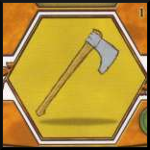|
Paper Kaiju posted:Consider the following. There are two different types of randomness in board games: the type that drives strategy (good), and the type that invalidates it (bad). To give examples of these two types, let's take a look at Cyclades. That's a rather simplistic way of looking at a mechanic. PRADA SLUT was talking about introductory games. Randomness that "invalidates" strategy is ideal for a newbie game because it makes the game more balanced in favor luck and lets a new player win by chance. Once you're an expert yeah you want to play games that reduce randomness as much as possible to show off your skill; but just starting people like to think they at least have a chance of winning a game they are going to devote several hours of their life to.
|
|
|
|

|
| # ? May 13, 2024 00:46 |
|
I totally disagree that letting a new player win by chance is a good thing. It's nearly as bad as just throwing the game. How on earth is that good? Maybe I've just been lucky I havent played with new players who have to win to enjoy the game, but if I ever did, that would be the first and last time I played with that person.
|
|
|
|
We've been over this a million times but let's do it again. Randomness does not make a game more "newbie friendly", because it's just as likely to screw the new player over as the veteran player, if not more likely, because at least the veteran is likely to have some idea of how to mitigate the randomness, how to make contingency plans, etc. If your great introduction to modern games is playing some random crapshoot luckfest with a non gamer, you might as well sit down and play Monopoly with them. Play a game with meaningful agency and just go easy on them for a bit so they have a chance to learn without being utterly demolished at every step. It's not always an easy thing to do, but nobody said introducing people to board games would be easy. On a side note I find it interesting that by filing off some of the chaff from Ascension, Star Realms more prominently showcases just how awful and broken the random center market is as a mechanic in a deckbuilder, and as a result is even more mind numbing to pay. Scyther fucked around with this message at 15:17 on Dec 20, 2014 |
|
|
|
Scyther posted:We've been over this a million times but let's do it again. Randomness does not make a game more "newbie friendly", because it's just as likely to screw the new player over as the veteran player, if not more likely, because at least the veteran is likely to have some idea of how to mitigate the randomness, how to make contingency plans, etc. If your great introduction to modern games is playing some random crapshoot luckfest with a non gamer, you might as well sit down and play Monopoly with them. It's psychological not mechanical. When you lose at a particularly random game you don't know if you lost because of inferior skill or because of the dice; this lets defeat seem less bitter. There is a reason that children's games like Candyland/snakes&ladders are entirely random. Imagine it's the 18th century and I am asking for a board game recommendation for a new player. Everyone here is saying that they should play GO, anything else is a waste of time. I'm trying to say that maybe Backgammon or Craps would be a better game to start off with.
|
|
|
|
Rutibex posted:It's psychological not mechanical. When you lose at a particularly random game you don't know if you lost because of inferior skill or because of the dice; this lets defeat seem less bitter. If you're going to get into psychology you're very quickly going to have to face the reality that, unsurprisingly, people's brains work differently, and the situation you're describing here is the exact opposite of my reality, and that of many people I've introduced to games.
|
|
|
|
It really depends on the person. My friend and I's first board game was Puerto Rico, and that was enough to get us into a bunch of other stuff. We then got the rest of our friends in with stuff like Dominion and other Euro-style games, as well as other stuff like Citadels and Battlestar Galactica. Of course, nowadays when we get new people my friend goes with lighter card games and stuff like King of Tokyo/New York and The Resistance. Honestly, theme's probably more important than mechanics in getting people to try new games (assuming the mechanics aren't complete poo poo, of course). For example, if they find a farming game intriguing, I'd have no problem throwing them into Agricola (my friend's sister-in-law isn't big into the board games we usually play but still liked it a lot when we played the Family Version). People aren't going to automatically dismiss a game just because they're losing, and they aren't necessarily going to lose interest if the rules take awhile to explain (and if they do, you may not want to play board games with them anyway and it may just not be the hobby for them). Hell, maybe they won't like the specific game yet still be intrigued enough to try more things. Hell, one of the recommended beginner games in the last thread's OP is freaking Battlestar Galactica, and even though there's a ton of fiddly bits and weird rules and long play times the experience alone is enough to sell a lot of people once they actually play it. So don't be too afraid to throw people into the deep end immediately.
|
|
|
|
There are going to be newbies that are going to be annoyed at the luck because they feel like they couldn't have done anything to mitigate it and it leaves a sour experience, especially if the game isn't totally about luck but luck + experience (which many of them are). Scyther is right: people's brains are wired differently and some people might think 'oh well, it was just random luck that made me lose, no big' while others might think 'i had no chance in that game because of random luck!'. Neither way of thinking is wrong: if you really want non-gamers to enjoy themselves without fail, I would suggest co-ops, because 'the game targeted me' is worse than 'the game targeted us'. Then randomness doesn't really have any effect at all.
|
|
|
|
Even when I was a new player I would far prefer to lose because I messed it up, than lose OR win because the RNG screwed someone. If I lose because I messed it up, I come out of it with a better idea of how to win next time. If I lose because the dice happened to hate someone... what did I learn about playing the game?
|
|
|
|
In my opinion, the most charitable thing I can say about RNG is that it adds an element of risk management. That does NOT make the game more easy. Good implementation of RNG makes the circumstances of the game different without deciding the winner, and bad implementation can decide the winner despite the players' actions. The latter is good only in the case that you're dealing with players who are incapable of making decisions.
|
|
|
|
PRADA SLUT posted:That just forces you to play a balanced game. You want to play greedy and throw everything you've got behind one strategy, that's fine, but you risk getting wrecked by something else. If you load up on nothing but power and then a few flops happen where there's nothing to use it on, you can cry about deck RNG conspiring against you, or you can be like "well gently caress, probably should have diversified my deck a bit more the past 5 turns". That's the point of playing tactics is that you don't know what board state you're going to find yourself in, you can either play greedy and go for one strategy only (which will cause you to lose in certain board states), or you can diversify to hedge against other possible board states, at the cost of a less synergistic strategy. Yes, that is the game's strategy; it is also the game's ONLY strategy. And that is the primary problem with Ascension. If a game has a single dominant strategy and a shared randomizer, then once all of the players know what that strategy is and attempts to implement it, then the whims of that randomizer end up deciding the winner, not the players' actions. Ascension is a game with no skill curve, simply a binary state of 'knowing how to win' and 'not knowing how to win'. Mega64 posted:Not disagreeing with this, but it's somewhat mitigated by monsters only being able to be bought in order of the gods that turn, which can force some strategic bidding if people see the game-winning strategy for a person with it. This is what I meant by 'the player who simply had the most cash on hand the turn one of those cards came out' wins the game, because they'll just dump all the cash they have, minus the cost of the monster, to secure the top god. No need for strategic bidding if no one can out bid you and game is about to end (and yes, I know money is hidden, but it's not hard to keep track of whose is flush and who is strapped if you're paying attention to income and spending). Scyther posted:On a side note I find it interesting that by filing off some of the chaff from Ascension, Star Realms more prominently showcases just how awful and broken the random center market is as a mechanic in a deckbuilder, and as a result is even more mind numbing to pay. This. Star Realms is far more random than Ascension because the synergies between card types actually matter, so the dominant strategy (focus on only two colors, or one if possible) is even more obvious, and getting screwed by the market deck hits you even harder. Rutibex posted:It's psychological not mechanical. When you lose at a particularly random game you don't know if you lost because of inferior skill or because of the dice; this lets defeat seem less bitter. There is a reason that children's games like Candyland/snakes&ladders are entirely random. You do realize that your argument works under the assumption that all board gamers have the emotional maturity of children? If this has been true for your experience, then all I have to say is that you have my condolences.
|
|
|
|
I'm going to wade into this ~serious mechanics chat~ and just say I bought Kingdom Builder for my tablet. It's pretty good, if I didn't already know it was by DVX I probably would have guessed. Serously considering buying it for the table after Christmas.
|
|
|
|
Wow, there are some serious strawmen being erected in this thread. The conversation is going like this: A: "Randomness in games is good because it means everyone has a chance to win, even if there is a skill gap." B: "People who only have fun when they win are immature and bad. Just don't play with those people." Which is equivalent to: A: "I didn't enjoy the book as much as I could have, because I was still on Chapter 1 when someone told me the hero dies at the end." B: "What, so you only like books with happy endings? Pretty immature, don't you think?" See why this is a bad argument? It's not about who actually wins, it's about the excitement of an uncertain outcome. Playing a game of pure skill when there is a big skill differential is like reading a book whose ending has been spoiled for you. It's less fun for both players. Given the choice between a lopsided game with a foregone conclusion and one which is exciting up until the end because there's always a chance that my opponent is going to get his miracle roll on the final turn, I'm going to play the latter every time. Luck doesn't take agency away from players, either, it actually adds agency, because for most games the last-minute miracle isn't a fixed probability. If you play a bit better than your opponents, maybe they've got a 25% shot at pulling off a comeback, but if you play way better, they've only got a 5% shot. Whereas most people, if I play them at Go, for instance, they have a 0% chance of winning from the start. They can spend five minutes thinking about their moves or make them randomly, and it won't matter. They may still enjoy the game because of what they learn from it, but there's certainly no excitement surrounding the outcome, and no sense that they're in control of their destiny and could win if they try hard enough. Whereas, despite being semi-professional at it, I can play poker with my friends who are clueless newbies, and it's still exciting for them not just because they can hope to win, but also because their moves do matter: if they play better than usual, they will still need some luck to beat me, but less of it than if they play worse. xopods fucked around with this message at 16:55 on Dec 20, 2014 |
|
|
|
There's quite a lot of strawman in your post as well, because no one is advocating to just go for pure skill, all the time, but systems in which randomness is used well and is not detrimental. Let's use a similar conversation to you: A: "Randomness in games can be bad because it can create situations in which the skill gap is acerbated because luck favours the more experienced player" B: "People who feel hard-done by luck aren't your typical newbie, newbies don't mind losing through luck" Let's all stop this crap. There are people that, if they go through the game and get unlucky throughout it, are going to have a bad time. There are people that can lose a game that they are playing, have no chance of winning throughout the entire thing and think 'well I did X and Y wrong and I need to improve those things, but I had an awesome time!'. Let's not pigeon-hole newbies in either of those two categories. Let's take your poker example: people might play it, have bad luck throughout the entire time you are playing it and feel worse because of it. Is that an ideal scenario? Is it the fault of the newbie because he should have worried less about luck? Can we just agree that there isn't a size-fits-all in terms of newbie games and that you can't necessarily say that high luck/low luck games are better for newbies until you have had a chance to see what the newbie actually likes? Tekopo fucked around with this message at 17:04 on Dec 20, 2014 |
|
|
|
xopods posted:Luck doesn't take agency away from players, either This isn't a fixed constant, though. Luck can certainly take agency away; imagine a game where, due to bad draws, a player simply doesn't get to do anything for one or more turns. That isn't fun, whether or not you're a new player or an expert. This is why variation isn't just a blanket good thing for new players - sure, it evens out the playing field, but with some types of randomization, it can end up with the new player not even getting to experience the game.
|
|
|
|
Tekopo posted:Can we just agree that there isn't a size-fits-all in terms of newbie games and that you can't necessarily say that high luck/low luck games are better for newbies until you have had a chance to see what the newbie actually likes? I didn't say that every post on the subject has been unreasonable, though I suppose you could read the beginning of my post that way. Sorry if I was unclear, but I was responding specifically to people like Lorini and Paper Kaiju who were casting "need to feel like there's a chance of winning" as equivalent to "need to win" and making assertions about the maturity level of people who feel that way. And yes, I absolutely agree that different people like different things in a game and that's okay. Which is precisely why it irked me to see people's tastes being painted as a character flaw. Asymmetrikon posted:This isn't a fixed constant, though. Luck can certainly take agency away; imagine a game where, due to bad draws, a player simply doesn't get to do anything for one or more turns. That isn't fun, whether or not you're a new player or an expert. This is why variation isn't just a blanket good thing for new players - sure, it evens out the playing field, but with some types of randomization, it can end up with the new player not even getting to experience the game. That has little to do with luck, though. A game of pure skill can also present situations where one player can put the other in a situation where they have few options and can't do anything productive. The existence of those situations is a design flaw regardless of whether they arise randomly or strategically. xopods fucked around with this message at 17:38 on Dec 20, 2014 |
|
|
|
No, it has everything to do with luck. I don't mean 'has no good options', I mean 'has no options'. There is an important difference.
|
|
|
|
xopods posted:That has little to do with luck, though. A game of pure skill can also present situations where one player can put the other in a situation where they have few options and can't do anything productive. The existence of those situations is a design flaw regardless of whether they arise randomly or strategically. Are you saying that not having any options in a game of chess/go/Agricola is the same situation as drawing the "you're delayed. Skip a turn" in Arkham or "Go to Jail" in Monopoly?
|
|
|
|
xopods posted:Sorry if I was unclear, but I was responding specifically to people like Lorini and Paper Kaiju who were casting "need to feel like there's a chance of winning" as equivalent to "need to win" and making assertions about the maturity level of people who feel that way. I was actually just mocking Rubitex for using games literally designed for children to prove his point, but whatevs. I've long since given up on having a rational argument with him. VVVVV: I would love to play board games with you if you weren't on the opposite coast as me 
Paper Kaiju fucked around with this message at 18:27 on Dec 20, 2014 |
|
|
|
I play games with random factors all the time. My point was that if you need to win and therefore you need to play a game where you can randomly win, I don't want to play with you. I've got two or three other people at the table as well, and maybe they want to win too. If anyone is going to say 'well you have to have random factors in a game so a newbie can have a chance to win', then as Tekopo says, you have to go with co-ops. I don't think co-ops are great for newbies, or at least you have to be careful with them, because there is nothing worse than sticking a newbie in a co-op with a high end quarterbacker. The newbies retreat to their phone/tablet and are never seen again. People's tastes may or may not be a character flaw, but I have no obligation to play with any given person. If a person smells bad, I'm not playing with them. If they scream and yell, I'm not playing with them. If they go into an AP stupor playing Splendor, I'm not playing with them. I know of no law that says I have to play with anyone who comes along. Why is that being implied? We all have our preferences as to who we like to play with, and who is to say any one person's preferences are wrong? I will note that winning a game doesn't mean poo poo to me, and I think I do a good job while playing to show why winning doesnt' even need to be the goal. The goal for me is to play well, and if I've played the game before, to play better than I did the last time. I will also note that I'm in the Los Angeles area, there are a zillion people to play with, meetups/FLGS/conventions all the time. I could play every single weekend day somewhere in the LA/Orange county area, so I can afford to be more picky. And one of the main reasons I live here is for the variety and choices being a board gamer gives me here. I have yet to lack for players, and if you visit my meetup.com group, you will see plenty of glowing reviews. I set up the environment in such a way that people know what to expect. And people like that. I feel kind of bad, because I feel like I come across as a real bitch in this group, but I don't think people who have played games with me would describe me as such. But I do have my limits  . .
|
|
|
|
If everything you say is true, why do you bother to play with newbies at all? Why do you even care about the issue of what makes for a good newbie-friendly game? Sounds like you're out for the best gaming experience for yourself, and you have a deep pool of experienced opponents that are eager to play all sorts of games. The rest of us may not be in this situation, and also we may want to play with our friends who we like even though they haven't (yet) developed a terribly enlightened view toward boardgaming. McNerd fucked around with this message at 18:34 on Dec 20, 2014 |
|
|
|
McNerd posted:If everything you say is true, why do you bother to play with newbies at all? Why do you even care about the issue of what makes for a good newbie-friendly game? Sounds like you're out for the best gaming experience for yourself, and you have a deep pool of experienced opponents that are eager to play all sorts of games. I get newbies all the time. That's why I'm paying +$150 a year on meetup is for newbies. The newbies that I've seen don't need to win, they are there mostly to learn new games, to meet interesting people, and to have a good time. My best gaming experience is when others are having a good time within the limitations that I listed (and those limitations all have to do with other people having a good time; there's nothing worse than a smelly player to make everyone leave). I talk with the newbies to know what they want to play, I nearly always have a game that will fit (noting that my meetup introduction explicitly says that we don't play party games or games using a 52 card regular deck; again setting up the environment for a newbie's expectations). I teach them the game, I don't let them win nor do I try to beat them into the ground. I don't think I have any all skill games that I teach newbies, most times it's Ticket to Ride, Transamerica, 10 Days in Europe, that kind of thing. The definition of a newbie friendly game is completely different than the discussion of do newbies need to have a chance to win a game. Perhaps they both end up in the same place, but the start is totally different. A newbie friendly game is one that can be explained within no more than 10 minutes, one that has a clear user interface, one that has a very limited number of choices on a players turn (which is why Agricola never works except the family version), and one that is over within 40 minutes or so. Naturally the game has to be we'll call it 'engaging' instead of 'fun' as well. Hive has no random elements and could fit as a newbie friendly game and 10 days in Europe has plenty of random elements. But the random elements or lack thereof is not what makes the game newbie friendly.
|
|
|
|
Thanks to the guy a few pages back that mentioned that Kemet was for cheap, my copy came today! Skimming through the rules i was very surprised it's only 8 pages (those pesky other languages making up the majority of the manual) and it didn't seem complicated to play, but how newbie friendly is it? By newbie, i mean the people i'm thinking of playing this with have played Risk so they're at least a little familiar with the concept of moving dudes on a board and attacking, but they are also the kind of people who i'd have to explain what a VP is too.
|
|
|
|
I think it's important to distinguish between a newbie game and a casual game. Light games to play occasionally with non-gamers should have a smaller gap in results between skilled and unskilled players, otherwise the guy who owns the game just wins every time. But that doesn't mean War is a gateway game for aspiring Chess players, who would appreciate a game of skill and working to improve their ability.
|
|
|
|
Lorini posted:I play games with random factors all the time. My point was that if you need to win and therefore you need to play a game where you can randomly win, I don't want to play with you. But again, my point is that needing to feel like you have a chance of winning is not the same as needing to actually win. In fact, I think you're looking at this completely backwards. It's not the people who enjoy high-luck games who are obsessed with winning - it's the people who can't stand those games, because they're the ones who freak out when they did everything right and still lost because they got unlucky. Fat Samurai posted:Are you saying that not having any options in a game of chess/go/Agricola is the same situation as drawing the "you're delayed. Skip a turn" in Arkham or "Go to Jail" in Monopoly? Well, you never have no options in chess, Go or Agricola. You may not have the options you want, but with the exception of very particular positions in chess, there is always something at least somewhat beneficial for you to do on your turn. To make my point, let's look at Settlers of Catan. The main design flaw of the game is that to do anything at all you need resources, and the game does not guarantee that you get them. This is partially luck-based but also partially not, because there are a number of ways you can be denied resources. Sometimes you just straight up get hosed by the dice, which is clearly luck-based. But you can also end up with no resources because people keep blocking you and stealing from you with the robber. You can also be chronically short of a particular resource because you made poor initial placement decisions, and then someone beat you to the only port you were close to, and now no one will trade with you. None of those are luck-based things. Or consider the Curses in Dominion... a lot of people hate playing with the Curse-based attacks. I'm not sure you'd go so far as to call them a design flaw, because in some setups they can actually be quite interesting. But you may very well reject/redraw/alter a kingdom draw where you've got Witch and Sea Hag and so forth and nothing to trash or otherwise deal with Curses... because they directly deny players' agency. Again, Dominion does have a luck factor, but it's not luck-based that your opponent decided to buy three Witches and fill your deck with Curses and now half your turns are "welp, handful of green and purple again, your turn." Or certain deck designs for Magic: the Gathering. Stasis decks, or land destruction decks, etc. which aim to lock your opponent out of the game. Designing an effective deck along one of those lines is totally skill-based, and playing those decks well is arguably more skillful than, say, direct damage. It's definitely an intended part of the game, and figuring out how you're going to deal with those strategies is an interesting part of tournament play... but in a casual setting, if you were going to play with a friend on your lunch break, would you rather play the guy with the big creature deck, or the guy with the Stasis/permission deck? I think the reason you see the problem appear more in games with luck is simply that in a zero-luck game, the problem would occur so regularly that no one would play it. Consider check, in chess. You can severely limit the opponent's options by delivering check - sometimes he has only a single legal move to make. That's fine because it usually only happens a few times in a game, and often as part of a sequence that's actually going to bring about the end of the game. But imagine a chess-like game where it was common and strategically appropriate for one player to deliver some equivalent of check for like twenty moves in a row, while the opponent can do nothing but respond mechanically. That would, in all likelihood, be a bad and unfun game, but it would never even make it to your table because the designer would have rejected his idea as soon as this feature became apparent. Design flaws are much more glaring in zero-luck games in general because it's easier for players to exploit them, whereas in a game with a lot of luck, the problem may simply not come up 95% of games, and be blamed on bad luck when it does. xopods fucked around with this message at 20:01 on Dec 20, 2014 |
|
|
|
xopods posted:But again, my point is that needing to feel like you have a chance of winning is not the same as needing to actually win.
|
|
|
|
HOOLY BOOLY posted:Thanks to the guy a few pages back that mentioned that Kemet was for cheap, my copy came today! Skimming through the rules i was very surprised it's only 8 pages (those pesky other languages making up the majority of the manual) and it didn't seem complicated to play, but how newbie friendly is it? By newbie, i mean the people i'm thinking of playing this with have played Risk so they're at least a little familiar with the concept of moving dudes on a board and attacking, but they are also the kind of people who i'd have to explain what a VP is too. I've played Kemet once, so I'm a newbie at it. The biggest challenge at the start was having to go over all 48(?) power tiles. That's a ton of frontloading info. If you can somehow get them to at least peruse the pdf rules for it beforehand, it could make the actual sit down and teach a bit easier. The rules themselves are easy though. It's just there are some rules that aren't written very straightforward, like that silver gem power on top of the pyramid, and certain powers affecting combat but not actually being part of combat. I've only played it once, so I don't remember their names. I know I spent a lot of time during the game flipping through the faq trying to figure out how some of these powers worked.
|
|
|
|
Ravendas posted:I've played Kemet once, so I'm a newbie at it. The biggest challenge at the start was having to go over all 48(?) power tiles. That's a ton of frontloading info. If you can somehow get them to at least peruse the pdf rules for it beforehand, it could make the actual sit down and teach a bit easier. You have a reference sheet so that you don't have to go through the tiles one by one. People can grasp stuff on their own.
|
|
|
|
Gimnbo posted:You have a reference sheet so that you don't have to go through the tiles one by one. People can grasp stuff on their own. Isn't there only a single reference sheet? I'm not saying he has to teach each one. I'm saying each person either reads each one, or goes 'gently caress it' and buys random things and has a bad first game.
|
|
|
|
Tekopo posted:This is just a generalization and it's not helpful. Not everyone that like high-luck games is obsessed with winning. Not everyone that like deterministic game is obsessed either. There is a notable number of people that like non-random games, like me and Lorini, that don't give a poo poo about winning or not and instead, if they play a game that is highly random, will still thank people for playing the game and then mentally note 'this game is not for me'. Sure, there are assholes, but it's not like one side of the argument is populated by saints and the other one isn't. I wasn't lumping you guys into the category of "can't stand luck-based games." There's a big difference between not particularly enjoying something and being upset about it. And sure, some people who like luck-based games are jerks too, but there are different flavours of jerk in the world... and if we're talking specifically about hyper-competitive, winning-is-everything jerks, usually those guys are into the zero-luck games. Chess is notorious for having a lot of those types among its player base, and I've run into a number of them in the Go world as well. The obvious counter-point is poker, but there it's the money that brings out the competitive egos and foul temper. I've never seen anyone lose their poo poo over a game of Liar's Dice or other luck-based bluffing games when no money is involved. xopods fucked around with this message at 20:16 on Dec 20, 2014 |
|
|
|
Yeah i'm probably going to follow the recommendation that somebody made in the last thread about making copies of the reference sheet. I'd rather they take forever to make a decision on what they are buying than having them go "uh what the hell am i doing right now? Oh well gently caress i take this one" and end up losing because the power they bought didn't help them at all
|
|
|
|
Ravendas posted:Isn't there only a single reference sheet? That's fair enough. I like to go red but it took a few plays to realize that the reddest tile in the game, Crusade, was in white 
|
|
|
|
xopods posted:Or consider the Curses in Dominion... a lot of people hate playing with the Curse-based attacks. I'm not sure you'd go so far as to call them a design flaw, because in some setups they can actually be quite interesting. But you may very well reject/redraw/alter a kingdom draw where you've got Witch and Sea Hag and so forth and nothing to trash or otherwise deal with Curses... because they directly deny players' agency. Again, Dominion does have a luck factor, but it's not luck-based that your opponent decided to buy three Witches and fill your deck with Curses and now half your turns are "welp, handful of green and purple again, your turn." Sea hag is a swingy card; if all the players get it, and when it's played first, it flips an estate for one player and a sea hag for another, the latter player is closing on screwed. And it's not the worst card for that by a long short - Swindler is a lot more swingy for that sort of thing. Swingy cards in Dominion are problematic, but part of the game is a: playing lots of short games not one long one (particularly given how much first player advantage there is in DOminion) and b: knowing what's going to be swingy, and playing it appropriately.
|
|
|
|
xopods posted:But again, my point is that needing to feel like you have a chance of winning is not the same as needing to actually win. Sure, I know people who don't like Lords of Vegas because of exactly that, the die rolls can roll badly for them and then they get mad. I personally think it's pretty funny but not everyone would. At the end of the day, I can't be responsible for how people feel, we would agree on that right? I can only offer games that would appear to be appropriate for someone newly coming into the hobby. It's funny, I had this very conversation with a life long friend who came to one of my game days for the first time (she lives in the Bay Area and doesn't play board games). She thought that everyone knew more about the games than she did and therefore she could never 'catch up'. I didn't get the feeling that she needed to win the games, but she expressed that she wasn't playing competently and was just kind of going with the flow. I told her that's the way I play all the time. We aren't playing for lottery winnigs, and we aren't getting paid to play, so you push the piece or play the card and keep it movin' so to speak. I don't know if she'll get over her feeling of incompetence but I hope so. Your statement on the chess-like game reminded me of why Wizards of the Coast took out the land killing decks and the mill decks. While a loss is a loss, there's better and more engaging ways to lose than not to be able to play at all. For those who don't know, basically in Magic of the Gathering, you need land to play your spells. Early in the game's life, there were decks that simply killed an opponent's land. These weren't fun for the losers. And winning because you forced the player to dump all of her cards into her discard leaving her with nothing to play weren't fun either for the loser. So yes, I certainly agree that those kinds of games would never be appropriate for a newbie. Nor would 18xx games, a set of games notorious for losing in the first half hour of the game while the game goes on for another six hours. My roomate explains Stone Age, Puerto Rico, and Power Grid to new players that we think might enjoy those games. But he starts out telling them that they won't beat him in this first game. He'll help them understand the game so they can have a chance to beat him or other experienced players the next time they play, but there's few new game players ever that can beat players who are experienced with those games. Do the players come back for more? Heck yeah. One woman loves Power Gird so much (and she's never won) we always have to play if she comes. Another guy is determined to beat my roomate at Stone Age. 7 seven tries and he's still going at it. So I haven't seen that 'having a chance to win the game' be a factor in new players acceptance/enjoyment of the hobby. Now, I'm looking at a small sample size. Perhaps all of you guys out there see the need for newbies to win games their first time out and my experience is an exception.
|
|
|
|
xopods posted:Well, you never have no options in chess, Go or Agricola. You may not have the options you want, but with the exception of very particular positions in chess, there is always something at least somewhat beneficial for you to do on your turn. Not saying you're not right or that this was even your point, but in Chess and Go (I guess, I've never actually played Go), the better player will always win. So you have options for the move, but no real agency, since you're basically getting your rear end handed to you no matter what you do. Which means you can only teach those in two ways: A predetermined outcome (you win), or by playing badly on purpose, both of which will throw most people off. It's a lot easier to feel that you'e actually accomplished something in Agricola, because you've still made a farm, lovely as it may be, whereas in chess, you might have captured some inconsequential pieces, but you din't actually make any progress towards victory. And this throws some people off of chess Also, Poker is only a luck-based game on the surface, bluffing is the meat of it. The skill is just more nebulous than in Chess, but it's still high-skill and relatively low luck. As far as I've seen, you only reveal your hand in half the rounds you win, so obviously, it's not just about getting the right cards. BonHair fucked around with this message at 20:42 on Dec 20, 2014 |
|
|
|
xopods posted:I wasn't lumping you guys into the category of "can't stand luck-based games." There's a big difference between not particularly enjoying something and being upset about it. I don't think those people are hyper-competitive, but they sure view competitiveness in a way that is just as unhealthy as hyper-competitiveness. It's the sort of people that feel they should be able to win no matter what their experience of them and other players is and they feel like it is a personal affront to them if they feel they can't win 'simply because I have less experience'. It's the people that don't understand that the first few times you play a game are meant as a learning experience which you need to build upon. Those people are assholes. Hyper-competitive people are assholes too (although I have a hyper-competitive friend who is not an rear end in a top hat because he's only competitive against people that he knows are competitive and thus is perfectly nice to newbies).
|
|
|
|
BonHair posted:Also, Poker is only a luck-based game on the surface, bluffing is the meat of it. The skill is just more nebulous than in Chess, but it's still high-skill and relatively low luck. As far as I've seen, you only reveal your hand in half the rounds you win, so obviously, it's not just about getting the right cards. I play tournament poker semiprofessionally and holy poo poo is it ever a game with a lot of luck. Even the best players can have losing years. In the extremely long run, the most skilled players will always come out ahead, but that is true of literally every game that involves any decision-making whatsoever. When we talk about the luck factor of games, what we're really talking about is what kind of sample you'd need to establish firmly which of two players is better, and that sample size is very, very large in poker. Hundreds of tournaments or tens of thousands of cash game hands at a minimum before variance starts to even out. Even then... just to give you an example, I've now played 2845 multi-table tournaments on PokerStars, at an average profit of 65%: in my first 436 trials, I actually turned an absurd 377% profit due to running good. In my latest 400, I am actually at negative 8%. And I'm pretty sure I'm actually playing better now than back then. When you consider that most people do not play most of their board games even 100 times... yeah. Compared to almost any board game, poker is very much a game of luck first and skill second. It's just not entirely luck. xopods fucked around with this message at 20:48 on Dec 20, 2014 |
|
|
|
Ravendas posted:Isn't there only a single reference sheet? There are some decent reference sheet pdfs on BGG that I printed and pass out so the info is available. "Red is attack and movement, white is economy and DI cards, blue is defense and recovery" to give a general idea of what is what helps a bit too.
|
|
|
|
thespaceinvader posted:This is the only one of your examples I have a problem with - the problem with luck in Dominion and curses isn't having them at all - it's knowing how to cope with them in most cases. Witch is a pretty balanced cards, it's just more likely to have sloggy games. But we're not talking about balance, we're talking about agency. A mechanic can be totally balanced but also totally un-fun because it takes away a player's agency for a big part of the game. In terms of player experience, it doesn't really matter whether it's your own fault, your opponent's fault or the luck gods' fault that your hand is full of Curses on a particular turn. Whatever the reason, that is a boring turn. And like I said, Curses aren't always bad. They can be an interesting mechanic if there is some way of coping. But as I said, I would redraw a setup where there were one or more Curse-giving cards and no way to mitigate the effect, because as you say, it makes the game sloggy. The slogginess can be acceptable if there's some payoff in return - interesting ways to use other cards to cope with the Curses... but if in a given setup all they're going to do is slow the game down with no upside, then yeah, they're bad.
|
|
|
|
Golden Bee posted:"Concept" was a great game when we played a variant: How many clues can you get the rest of the table to guess in 5 minutes? Good idea, will definitely make the game have a fun, exciting scoring system instead of the dumb one that's included.
|
|
|
|

|
| # ? May 13, 2024 00:46 |
|
So is Cthulhu Wars the overpriced Kickstarter garbage it appears to be, or does it have anything of merit? I ask because I love asymmetric strategy games and this makes my nerd sense tingle, but I am like 80% sure I would be better off buying Quantum or Kemet instead.
|
|
|




























